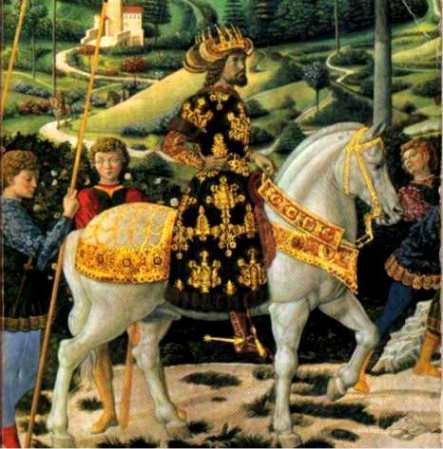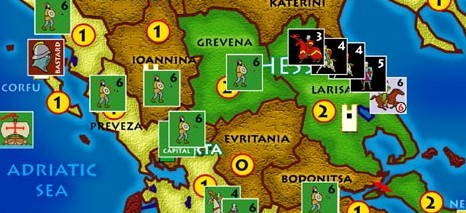Would you like to make this site your homepage? It's fast and easy...
Yes, Please make this my home page!
The Perfect Captain
"As soon as the sun began to turn, he formed up his lines and with war cries and tremendous shouting rushed upon the barbarians. However Tzachas was not found unprepared for he quickly had his men fully armed and joined battle with the Roman lines."
From The Alexiad of Anna Comnena
Welcome friend, to the page that asks, "who's the boss"?
---------------------------
Contact us
The Perfect Captain
---------------------------
A campaign game of power politics and warfare in the ruins of the Byzantine Empire 1204-1261 AD, including full colour graphics
Now available, the Rules in Italian! Special thanks to Stefano Bonazzi! Great Job!
In the year 1185
control of the decaying Byzantine empire was placed in the hands of the Isaac II Angelos, an ineffective and feckless ruler. Ten years later he had been deposed by his brother who reigned as Alexius III, but this did nothing to staunch the flow of revolted territories and the growth of petty warlords. Isaac's son (later Alexius IV) brought his case to the Latins of the Fourth Crusade, at the time besieging the Christian town of Zara for Venice. Unable to pay their debts to the unscrupulous, grasping, and blind Doge of Venice, Enrico Dandolo, the crusaders have little choice but to agree to his demands of supporting Alexius. Sailing to Constantinople in 1203, the crusaders restored the throne to father and son as co-emperors. Their overthrow (1204) by Alexius Ducas (Alexius V) led to the storming and sacking of Constantinople by the Crusaders.
The resulting power vacuum led to chaos.
The Latins quickly divided the empire into smaller principalities. The local Greek reaction ran from stunned inactivity to active resistance, with many joining the Latins in gathering the spoils. They eventually set up three main governments in exile, each claiming to be the legitimate successor to the empire- one in Epiros in eastern Greece, one in Trebizond on the north shore of Asia minor, and one in Nicea, dangerously close to the asian suburbs of Constantinople. Numerous other nobles set up even smaller despotates in Thebes, Argos
Dyrrachium, Smyrna and Ephesos.
The Latin conquerors looked to spread out over Greece and claim their shares. Principalities were established in Athens, Andravida, Thessalonika, and on Crete. In Constantinople would sit the Latin emperor, with hopes of absorbing Greek holdings in Asia Minor.
To the north, the revived Bulgarian empire peered south in hopes of at last installing themselves in Macedonia and on the throne of Constantine. In the east, the Seljuk Turks saw the opportunity to turn back the clock on 100 years of Byzantine reconquest of the territories they themselves had conquered since the battle of Manzikert in 1071.
The stage was now set for 200 years of almost constant warfare.
The Game
"In the Shadow of Byzantium" puts you at the head of a principality struggling to survive and overpower your neighbours. Judicious use of slender finances to create armies, alliances and acts treachery is essential to victory. Bind other princes to you with marriage alliances to gain a breathing space to perhaps build fortifications to protect your land. Who dares truly wins in this game of big chances and big payoffs, but the winner of today could easily be the loser tomorrow.....
The game can go up to twenty turns, but thanks to our variable game termination rules, the last turn could be anytime between turns 12 and 20, thus making it virtually impossble for the "gang up on the leader" syndrome to ruin everyones fun. One player is rarely so far ahead that they become the target of other players anyway.
The players to choose from:
The Empire of Constantinople
The Nicean Empire
The Duchy of Athens
The Principality of Achaea
The Despotate of Epiros
The Kingdom of Thessalonika
The Venetians of Crete
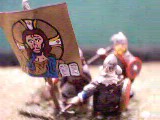
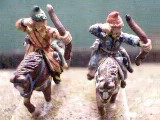
In the Shadow of Byzantium can be played with up to seven players. A four player game takes about 2 hours to play. There is very little set up and almost no record keeping (just treasury- big deal!). We had so much fun playing this game first time out we believe it is destined to be one of our most popular products ever. It is a fast paced nail-biter where the victor is in doubt until the last turn. Although there is no miniatures conversion available yet (keep an eye out for an Ironbow supplement, though), it shouldn't be to hard to convert to whatever miniatures rules you use.
The counters include bands of Knights, Stratiotes (Greek Archons), nomad horse archers, spearmen, bowmen, leaders (Dux's) and Bastards. Yes, you read it right, Bastards. It's NOT A DIRTY WORD (In this case)! It was often Bastard son's of more powerful princes that set up petty kingdoms in various places, and if not them, then some other B*****d. There. Satisfied? You made me say Bastard five times in one paragraph. Sheesh! Anyway, read up on John of Thessaly, the bastard (that's six!) son of the Despot of Epiros in the mid 13th century and his petty empire, and on Leo Sgourgos, who in the early part of the century (even before Constantinople fell) controlled Athens, Thebes, and Argos!
The board is divided up into territories called fiefs. Player expand their hold on power by aquiring more fiefs, either through diplomacy or through conquest. Controlling shipping gives a prince flexibility and a long reach. Holding onto passes and fortifications can stop and invader cold in his tracks.

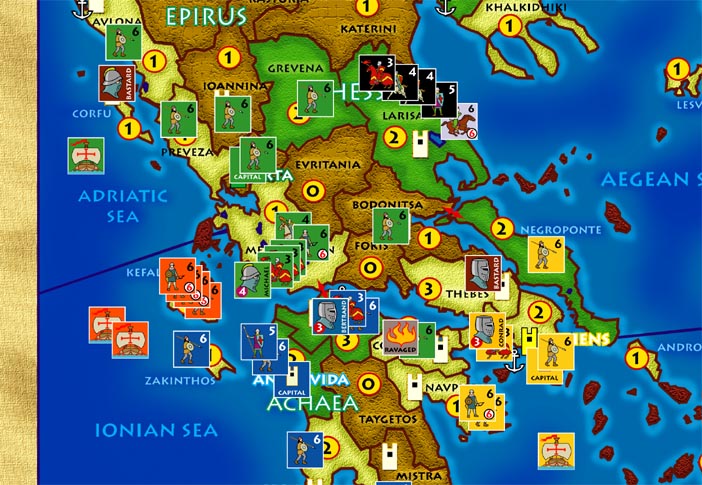
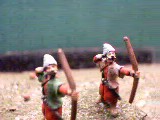
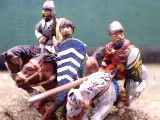
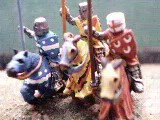
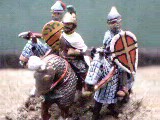
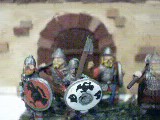
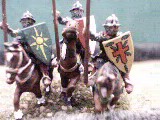
The key to this game is expansion. There are a wealth of free fiefs at the beginning of the game. You have to grab them as fast as you can to build a power base. You can even start with territories nowhere near your home base to try and become a thorn in the side of your enemies. Witness what happened to the Achaean Franks after the Byzantines go hold of three castles in the Peloponnese in 1263.
You may have to come to agreements with your neighbours to avoid an immediate war of extermination. Or you might try hobbling your opponent early, but watch out. It is difficult to keep a player down. In one game, the Emperor of Constantinople lost his capitol and all his mainland territories, but was able at the last minute to capture the island of Naxos with his one ship and one remaining band of spearmen. Within five turns he was the pirate king of the archipelago, and held the balance of power on the high seas between the Athenians and the Niceans.






